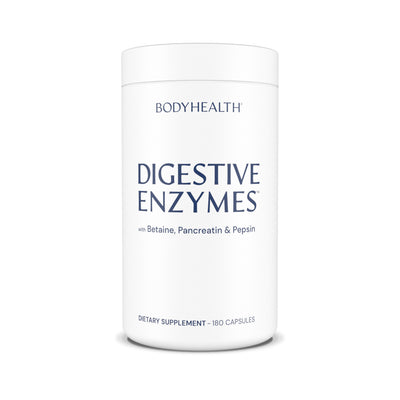The Key to Sustainable Fat Loss: Calories + Hormones
January 05, 2025 7 min read

This article is part of the Guide To Sustainable Fat Loss, a series that includes articles on key topics and a precise protocol to help you lose inches and keep them off, reduce cravings, shape and tone body and muscle, address hunger and fat loss hormones, improve sleep and mood, and much more.
You can find a complete index to this series at the bottom of this article.
Sustainable Fat Loss: Calories + Hormones
You've probably heard of calorie counting. It's something you're told you must do on any diet to lose body fat.
And this is true.
But there's much more to it than that.
Because if you only did calorie restriction, and addressed nothing else, you'd most likely fail at the diet, or, if you made it through, you'd almost certainly gain it all right back again.
So, while we'll start this article with calorie counting, make sure you read all the way through, because it's just the tip of the iceberg.
Let's begin.
Counting calories is very simple.
Foods contain energy your body needs and that energy is measured in something called calories.
If you eat more calories (energy) than your body needs, then it will turn the extra calories into body fat (stored calories).
So you gain fat.
If you eat less calories than your body needs, it will burn the calories in your body fat to release the energy.
So you lose fat.
It’s that simple.
Now, every pound of body fat contains about 3500 calories.
So, if you need 3500 calories in a day for your normal energy levels, you could eat enough food to get 3500 calories, and your body wouldn’t burn any fat. Because it wouldn’t need to.
Or, you could not eat all day, and your body would be forced to burn a pound of body fat to get the 3500 calories of energy from it. So you lose a pound of fat.
Here’s the thing. It should do this. But it doesn’t always…
This is because of your hormones.These are messenger chemicals in your body that tell your cells what to do or not do.
They tell your cells whether to burn fat for energy or not.
If they’re functioning properly, and you need energy because you haven’t eaten, then they will send instructions to burn body fat for energy.
But if they’re not functioning as they should be, then even if you were starving and needed energy, instead of directing your body to burn fat, they may just make you feel tired so you won’t use energy.
These hormones control everything regarding fat-creation and fat-loss.
And that’s one big factor missing in calorie counting and other diets.
You can cut the calories, but unless the hormones then say to burn fat for energy… your body won’t.
It’s all about properly functioning hormones.
When they’re in balance we have no problems losing fat and keeping it off, and we don’t experience strong cravings for junk food.
When we’re hungry we eat and when we’ve eaten enough we don’t feel hungry anymore.
But when they’re out of balance they usually make us keep the fat no matter what, feel starving when we’ve just eaten, have low energy, and even make it hard to sleep.
And what’s throwing our hormones off are modern processed foods and processed sugars.
This is why it’s more than just counting calories. It’s also where those calories come from.
Some foods trigger “fat-loss hormones” and some foods trigger “fat-creation hormones”.
So you could have two different foods, each with the exact same amount of calories — but one would influence your hormones to build fat and one would influence your hormones to burn fat.
Do you see the problem here?
We can’t only cut calories. We also need to ensure we’re eating the foods that both provide the real nutrition our bodies need, and at the same time, balance our hormones so they correctly burn excess fat.
So make sure to only eat the foods in the approved lists and to keep away from any processed sugars or processed, packaged foods during this protocol.
Those foods contain the ingredients that unbalance our hormones so it’s both hard to lose fat and our cravings stay strong causing us to gain it all back again afterwards.
But there’s another point to cover before we jump into the protocol and diet and get you started, and that’s protein!
Because without sufficient protein your body also can’t burn excess body fat.
THE MISSING PIECE IN ALL DIETS: PROTEIN
There are several key things that must occur in our bodies to achieve sustainable fat loss, some we just covered and all of which we’ll cover more soon:
- The hormones that control our body fat levels must rebalance so our body naturally burns excess body fat.
- Our hunger hormones must balance so we’re hungry when we need food and not hungry when we don’t.
- Our cells must restructure themselves to burn fat for energy, not just sugar.
- Old cells must be replaced with newer, more efficient cells.
- Muscle must be built as it is the body’s single largest source of fat-burning. The less muscle we have, the less fat-burning occurs.
- Our digestion must be gotten up to snuff so the foods we eat are fully broken down. If they are not fully broken down then our cells do not get the nutrition they need to make the chemicals that do the actual fat-burning.
Now, all of these points rely on one key thing: Protein.
Your hormones are made of protein. So if you don’t have enough protein, your body can’t make necessary hormones in the amounts needed.
The enzymes (chemicals) that burn fat are made solely of proteins. Without enough protein to keep these in steady supply you will not have enough to burn fat speedily.
If you’ve been on a higher sugar diet for some time then your cells are structured to take in sugar more than they are to take in fat for energy.
So when you cut out sugar to force your body to use body fat as fuel, the cells are not structured to take it in fast enough to keep up with energy needs. So they cry out for more sugar, what they’re set up to receive.
These cells must be restructured so they can burn body fat for energy, and protein is what does this. And, as we need to do this fast, we need a high amount.
Most people don’t eat much whole food protein anymore. They eat protein bars or protein powders.
But these ruin our digestive systems over time, feed harmful bacteria and give us much less usable protein than whole-food proteins do.
So we’ll be doing two things:
First, you will be consuming a high amount of whole-food protein.
And, as your digestive system will most likely not be used to this (along with most of America today), you will be taking digestive enzymes with each meal to ensure proper digestion.
This is for a few reasons:
One, We need your protein fully broken down so your body gets all of the nutrition it needs from it.
Two, partially broken-down proteins can raise cortisol levels, hindering fat loss. So we need them fully broken down.
And three, digestive enzymes and stomach acid are needed to kill off harmful bacteria that can enter with food and water and which can cause cravings for sugar, something we don’t want.
And you will also be taking PerfectAmino.
We will cover this more further on, but PerfectAmino provides your body with the exact building blocks of protein in a form that it can full absorb and use no matter the state of your digestive tract.
Many people report a marked decrease in cravings after taking PerfectAmino, as well as fat loss occurring naturally.
At the same time their energy levels go up, their skin clears up, their strength improves, and much more.
This is just their body getting the protein it needs in the quantities it needs.
So PerfectAmino is key to this program and, along with whole food proteins and digestive enzymes, is what will get you through the cravings period of this protocol the fastest (about 5-7 days for most people).
And it will significantly speed up the restructuring of cells and rebalancing of hormones for sustainable fat loss.
So do not skimp on the whole-food protein or PerfectAmino.
Alright, let’s get started!
Go to The 30-Day Fat Loss Challenge: Diet & Protocol.
You can purchase any products you may need and save 15% when you sign up for a subscription, or save by getting a 30-Day Fat Loss Protocol Package.
And if you haven't already, make sure you join our BodyHealth Community where you can ask all your health & fitness questions.
Index To The Guide To Sustainable Fat Loss:
Introduction & Getting Started:
- Introduction To Sustainable Fat Loss & The 30-Day Challenge
- The Key To Sustainable Fat Loss: Calories + Hormones
- The 30-Day Fat Loss Challenge: Diet & Protocol
- The 30-Day Fat Loss Challenge: Workout
- Workout Videos To Ensure Proper Form
Week One:
- What Makes Fat Loss So Hard
- Succeeding At Your Diet: Cravings, Hormones & What To Watch For
- 90% Of Body Fat Is Made From Sugar — Not Fat
- Reversing Insulin Resistance & Speeding Fat Loss
Week Two:
- Hunger Hormones: What's Causing Cravings For Sugar & Junk Food
- Digestion Is Key To Sustainable Fat Loss
- Cortisol: The Hormone That Makes Fat Loss Nearly Impossible
Week Three:
- How Poor Sleep Prevents Fat Loss
- Estrogen Dominance Prevents Fat Loss In Women & Men
- Raising Growth Hormone & IGF For Fat Loss
Week Four:
- Hunger Vs Cravings: When To Transition Out Of Fat Loss
- Transitioning From Fat Loss To Lean Body
- How Our Corn & Soy Based Diet Prevents Fat Loss
Week Five:
Articles by Health Topic
Your Path To Better Health Starts Here!
From in-depth articles on nutritional benefits to updates on new product launches, stay informed and inspired on your journey to optimal health.
*These statements have not been evaluated by the Food and Drug Administration. These products are not intended to diagnose, treat, cure, or prevent any disease.









